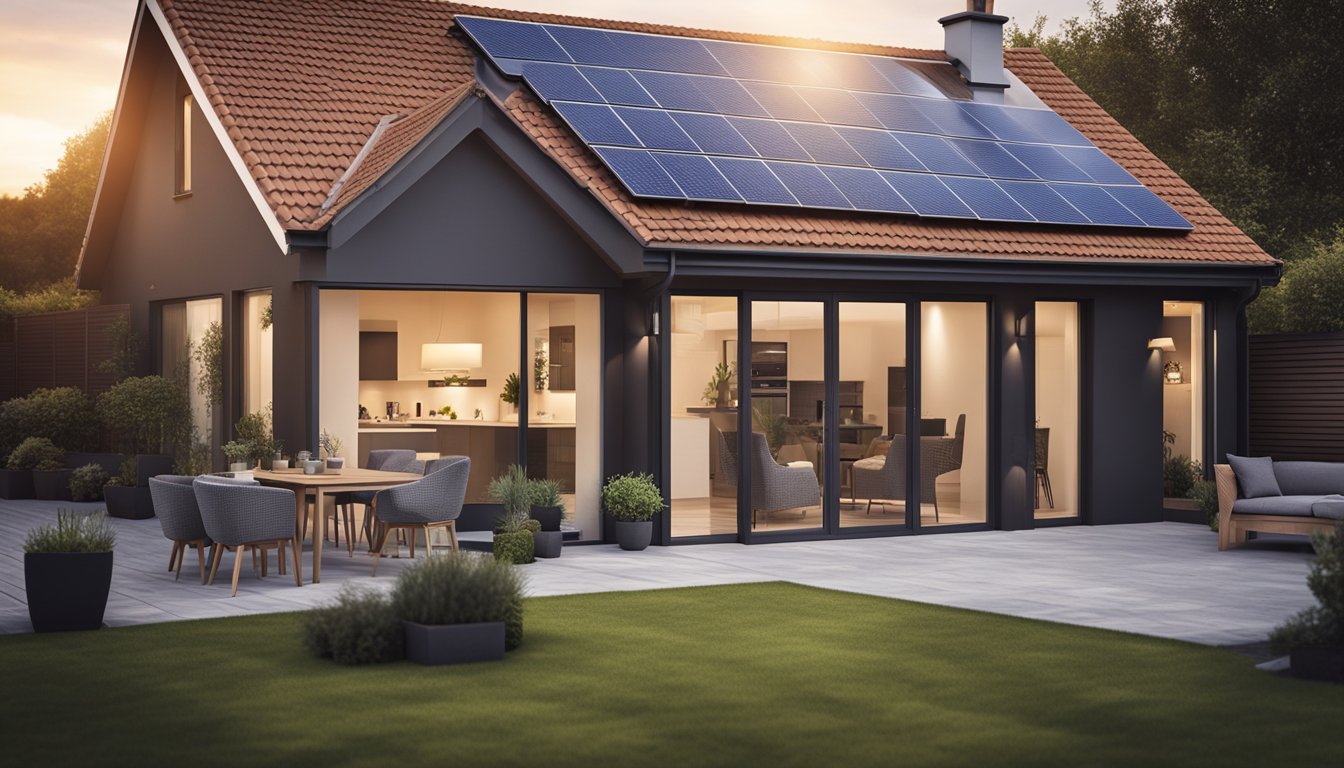Late updated: 25 Jan 2025 11:01
Written by: Eleanor Hartman
Home Energy Management Tips For British Households: Boost Efficiency and Savings
In today's rapidly changing world, managing energy usage at home is more important than ever for British households. With rising energy prices and growing concerns about environmental impact, finding effective ways to reduce our energy consumption has become crucial. The key to saving money on energy bills while contributing to net-zero emissions lies in adopting smart energy management practices.

Implementing energy-efficient practices in our homes doesn't have to be expensive or complicated. By making small yet significant changes, like improving home insulation and using energy-efficient appliances, we can drastically cut down on energy wastage. These practices not only lead to financial savings but also play a significant role in reducing our carbon footprint.
Many of us might not realise the impact of basic actions, such as proper draught-proofing or understanding our energy bills. These small steps, when combined, can make a substantial difference. Let’s explore practical tips together and make our homes more energy-efficient and environmentally friendly.
Key Takeaways
- Smart energy management reduces costs and emissions.
- Simple changes lead to big improvements in efficiency.
- Understanding energy bills assists in better consumption control.
Improving Home Insulation and Draught-Proofing
Enhancing home insulation and draught-proofing can lead to significant energy savings and reduced carbon emissions. By focusing on insulation options and effective methods for preventing draughts, we can cut energy bills and maintain a comfortable indoor climate.
Understanding Insulation Options
Various insulation options are available to improve home energy efficiency. Cavity wall insulation is popular in homes with space between walls, reducing heat loss significantly. Double glazing and triple glazing are effective for windows, limiting heat escape and providing soundproofing. Insulating loft spaces traps heat, preventing it from rising and escaping through the roof.
Proper insulation is a key factor in energy savings. It keeps homes warm in winter and cooler in summer. By investing in quality insulation materials, households save money and reduce their carbon footprint. Taking these measures requires an initial outlay, but the long-term benefits are evident in lower energy bills.
Tips for Effective Draught-Proofing
Draught-proofing is a cost-effective way to retain warmth and save energy. Simple DIY projects can make a significant difference. Begin with sealing gaps around doors and windows using self-adhesive strips or draught excluders. Chimney balloons or draught excluders can block unused chimneys, preventing heat escape.
Other areas to address include fitting a letterbox brush and covering keyholes. Professional draught-proofing services are available for those who prefer expert assistance, potentially improving the home’s energy efficiency. The Energy Saving Trust suggests that by draught-proofing your home, it’s possible to reduce energy waste significantly, which in turn could decrease energy bills. Taking these actions can contribute positively towards lowering our carbon emissions.
Energy-Saving Practices and Efficient Appliance Use

Incorporating energy-saving techniques and the smart use of appliances can significantly lower our energy bills and enhance overall efficiency. By focusing on heating systems, daily habits, and water usage, we can create a more sustainable household.
Smart Use of Heating and Hot Water Systems
Effective management of heating and hot water systems is vital for energy efficiency. Thermostatic controls are key in regulating your home’s temperature.
Setting your thermostat to lower temperatures can substantially reduce heating bills. Installing a combi boiler can also ensure hot water is only heated when needed, reducing unnecessary energy use.
Keeping our hot water cylinder insulated minimises heat loss. Turning down the thermostat on it saves energy without compromising comfort. We should also regularly service our heating systems to maintain their efficiency.
Adopting Energy-Efficient Habits and Appliances
Switching to energy-efficient appliances can cut down on electricity usage. Upgrading to appliances with the ENERGY STAR label ensures compliance with high energy efficiency standards.
Vampire devices—those left on standby—consume energy unnecessarily; we should switch them off. Replacing incandescent bulbs with LED lights is another effective measure. These bulbs use significantly less power and have a longer lifespan.
Being mindful about using electrical appliances only when necessary, such as operating the washing machine or dishwasher with full loads, can reduce both energy and water use.
Optimising Water Usage
Reducing water usage not only conserves a precious resource but also saves energy related to heating water. Let's focus on shortening our shower time, aiming for more efficient hot water use.
When washing dishes, using a dishwasher for full loads is often more energy-efficient than handwashing. If feasible, consider using eco settings to further save energy.
In the kitchen, fixing dripping taps can prevent unnecessary water heating. Implementing these practices can make a noticeable difference to our fuel bills.
Being conscious of these changes in habits and appliance use can collectively maximise our energy savings.
Frequently Asked Questions

In our ongoing effort to manage home energy effectively, we've explored various strategies such as reducing electricity consumption, saving money on energy bills, and measures to improve energy efficiency in UK homes. Let's break down some common questions and provide practical advice on these important topics.
What are the top strategies for reducing electricity consumption in British homes?
Using energy-saving light bulbs and appliances with high energy efficiency ratings can significantly reduce electricity consumption. Smart meters can help monitor and adjust usage. Additionally, unplugging devices when not in use prevents unnecessary power draw.
How can British households save money on their energy bills effectively?
Shop around for the best energy tariffs and consider switching suppliers if a better deal is available. Implement energy-saving habits, like washing clothes at lower temperatures and turning off lights in unused rooms. These actions can lead to noticeable savings.
What measures can be taken to make a house in the UK more energy-efficient?
Insulating lofts, walls, and floors helps retain heat and reduce energy consumption. Upgrade to double-glazed windows and invest in a modern, efficient boiler. These improvements can greatly enhance a home's overall energy efficiency.
What are the best practices to help make your home energy self-sufficient in the UK?
Installing solar panels can significantly enhance energy self-sufficiency. Pairing solar power with battery storage allows homeowners to store excess energy. Additionally, home wind turbines may be viable in regions with sufficient wind resources.
How can electricity usage be minimised in UK households?
Introduce smart thermostats to optimise heating systems. Energy-efficient appliances play a crucial role in minimising usage, particularly in high-demand areas like kitchens. Adopting these technologies can lead to a more sustainable energy profile for the home.
What steps can residents take to diminish energy costs across the UK?
Government grants and schemes, such as the ECO4, can assist in making homes more energy-efficient. Additionally, incorporating energy-conservation tips into daily routines, like reducing standby power and effectively using timers, can further decrease costs.